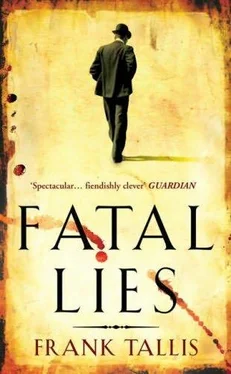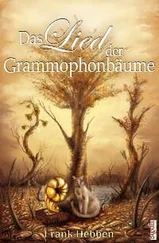Frank Tallis - Fatal Lies
Здесь есть возможность читать онлайн «Frank Tallis - Fatal Lies» весь текст электронной книги совершенно бесплатно (целиком полную версию без сокращений). В некоторых случаях можно слушать аудио, скачать через торрент в формате fb2 и присутствует краткое содержание. Жанр: Исторический детектив, на английском языке. Описание произведения, (предисловие) а так же отзывы посетителей доступны на портале библиотеки ЛибКат.
- Название:Fatal Lies
- Автор:
- Жанр:
- Год:неизвестен
- ISBN:нет данных
- Рейтинг книги:3 / 5. Голосов: 1
-
Избранное:Добавить в избранное
- Отзывы:
-
Ваша оценка:
- 60
- 1
- 2
- 3
- 4
- 5
Fatal Lies: краткое содержание, описание и аннотация
Предлагаем к чтению аннотацию, описание, краткое содержание или предисловие (зависит от того, что написал сам автор книги «Fatal Lies»). Если вы не нашли необходимую информацию о книге — напишите в комментариях, мы постараемся отыскать её.
Fatal Lies — читать онлайн бесплатно полную книгу (весь текст) целиком
Ниже представлен текст книги, разбитый по страницам. Система сохранения места последней прочитанной страницы, позволяет с удобством читать онлайн бесплатно книгу «Fatal Lies», без необходимости каждый раз заново искать на чём Вы остановились. Поставьте закладку, и сможете в любой момент перейти на страницу, на которой закончили чтение.
Интервал:
Закладка:
38
The special tutorial group met in Professor Gartner's rooms. On account of his age and seniority he occupied an entire lodge. It was his custom to spoil his favored pupils, and an impressive selection of pastries had been laid out on the table, ready for consumption when the tutorial was over: cheese and apple strudels, made especially for the professor by the school chef, and an artistically arranged spiral of ischler geback — fruit-conserve biscuits drizzled with chocolate.
The prospective feast was something of a distraction for most of the boys, who were gathered in a semicircle around their mentor. They stole quick glances at the spread, and their stomachs grumbled in anticipation.
Wolf, however, wasn't in the least troubled by the strudels and the sugary fragrances that sweetened the air. He had been transported by the strange declamatory prose that Professor Gartner had been reading aloud from a slim cloth-bound volume. Even though the old man's voice was dry and wheezy, the text vibrated in Wolf's memory. Each word possessed a gonglike, resonance. I teach you the Ubermensch… the superman… What is the ape to men? A laughing stock or a painful embarrassment. And just so shall man be to the superman… Where is the lightning to lick you with his tongue? Where is the madness with which you should be cleansed? Behold, I teach you the superman: he is the lightning, he is the madness…
Gartner sat in a high-backed leather chair. He was wearing his academic gown, and his short silver hair glittered in the lamplight. When he had finished his reading, he began a lengthy exegesis.
“What we are must be overcome. Man, as he is, must be destroyed. We must become something more than human… Homo superior. The philosopher is quite clear as to how this transition can be achieved. Man becomes Ubermensch by his will to power — by abandoning old doctrines and replacing them with new ones, by rejecting societal ideals and so-called morality, by a continual process of overcoming arbitrary self-limitations… The philosopher challenges us, throws down the gauntlet: Can you furnish yourself with your own good and evil, he asks, and hang up your own will above yourself as a law? Can you be judge of yourself and avenger of your law?”
The old man raised his head and looked around the room. Some of the boys shifted uncomfortably as his interrogative gaze made them painfully aware that they were not really listening. Wolf, however, leaned forward. He felt excited, but did not really understand why. The professor's gaze locked with his. Wolf was not unnerved by Gartner's scrutiny: on the contrary, he welcomed it. The boy nodded his head.
Yes, he said silently to himself. I can be judge of myself-and avenger of my law
Professor Gartner smiled at his most enthusiastic student.
39
Liebermann was sitting outside Csarda-the Hungarian restaurant where Trezska had suggested that they should meet. Although the sky was overcast, it was not a particularly cold day. The table was well positioned and offered a clear view of the tree-lined boulevard along which crowds of people-from all walks of life- were making their way toward the amusements, beer-houses, concert hall, and theaters. A Carpathian peasant, wearing a white fur cap, was wandering somewhat aimlessly in front of the restaurant, obviously overwhelmed by the festival atmosphere of the Prater.
When Trezska arrived, Liebermann stood to greet her, bowed, and kissed her hand. Stepping back, he smiled, showing his admiration with tacit but unmistakable pleasure. She was wearing a maroon jacket, cut to accentuate the slimness of her waist. The garment was decorated with black braid and was slightly reminiscent of a soldier's tunic. The folded-back cuffs were threaded with silver. Her gray skirt-which clung tightly to the curve of her hips-was woven with a muted blue check. She had pinned her hair up, and her hat sprouted a plume of exotic feathers. On the lapel of her jacket was the same brooch that she had worn for her concert: a crescent of diamonds. Close up, the glittering stones looked large and very expensive: More expensive, thought Liebermann, than a budding concert violinist should be able to afford As soon as this thought had formed, it was followed by a second: A gift from an admirer, perhaps?
Ordinarily, Liebermann was not a jealous person but the experience of discovering Miss Lyd gate in the arms of her lover had affected him deeply. He had become mistrustful, suspicious. At once, the young doctor was disappointed with himself, annoyed that he had already inferred the existence of a shadowy competitor!
“Is anything wrong?” asked Trezska.
Liebermann was astonished. He had not, as far he was aware, betrayed his inner feelings with a frown.
“No, nothing's wrong.” Anxious to conceal his embarrassment, he risked a bold compliment. “You look wonderful.”
Trezska did not demur, but returned his smile.
Liebermann was relieved to find that their conversation flowed more naturally than he'd expected. He had judged that she might be, by nature, quite reserved-aloof, even; in fact, he was quite wrong. She was warm, friendly, and quick to laugh. He asked her if she had been to the Prater before, and she replied that she had-but only to eat at Csarda. She was not familiar with the amusements. Liebermann suggested that they should visit the Kaisergarten-to which she again responded with unexpected enthusiasm. From Liebermann's experience, beautiful, fashionably dressed women often allowed their hauteur to harden into a brittle carapace. Trezska's excitement was endearing.
They inspected the menu, and while they did so Trezska extolled the virtues of the head chef. She insisted that Liebermann try his gulyas.
“They do it correctly here… a traditional recipe, not like the heavy goulashes you might be used to. Gulyas was originally a shepherds’ dish-the midday meal. It shouldn't be too rich.”
As on all Hungarian tables, there were three rather than two condiment shakers: one for salt, one for pepper, and a third for paprika. When the gulyas arrived, Liebermann was given a soup, instead of a stew, and at the bottom of his bowl he found large tender chunks of mutton. Trezska offered Liebermann the paprika shaker, which he declined-his gulyas having already been seasoned quite enough for his taste.
“Well, what do you think?” asked Trezska.
“Good-very good,” he replied. The gulyas was just as Trezska had described: wholesome rustic fare, but fragrant with tangy herbs and spices.
From inside the restaurant, a small band consisting of a cimbalom player and two violinists began a mournful waltz. Swooping glissandi and complicated embellishments suggested a Gypsy origin. It caught Liebermann's attention.
“An old folk song,” said Trezska, “Dark Eyes. It's all about a young hussar who is rejected and throws himself into the Tisza.”
A capricious smile played around her lips.
Their conversation turned to more serious music. They discussed the Bach violin and keyboard sonatas, Marie Soldat-Roger s interpretation of the Brahms D-major concerto, a new Russian opera, and the distinctive tone of pianos made in Vienna. After which, Liebermann encouraged his companion to talk about her own musical accomplishments. Trezska had only just begun to build a reputation as a solo artist in Budapest, having spent two years studying in Rome and Paris; however, she had won several scholarships, a competition in Prague, and had even played at a private function in Berlin for her celebrated countryman, the virtuoso Joseph Joachim.
“Do you have any more concerts planned? In Vienna?”
“No, sadly not: next year, perhaps.”
“Oh,” said Liebermann. “Then, how long will you be staying?” he added hopefully.
Читать дальшеИнтервал:
Закладка:
Похожие книги на «Fatal Lies»
Представляем Вашему вниманию похожие книги на «Fatal Lies» списком для выбора. Мы отобрали схожую по названию и смыслу литературу в надежде предоставить читателям больше вариантов отыскать новые, интересные, ещё непрочитанные произведения.
Обсуждение, отзывы о книге «Fatal Lies» и просто собственные мнения читателей. Оставьте ваши комментарии, напишите, что Вы думаете о произведении, его смысле или главных героях. Укажите что конкретно понравилось, а что нет, и почему Вы так считаете.












